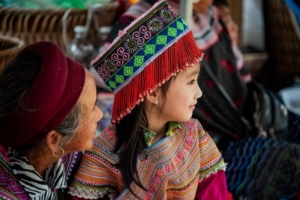Child Marriage in Vietnam
 According to Girls Not Brides, an organization dedicated to bringing an end to child marriage across the globe, 11% of girls in Vietnam marry before their 18th birthday. Approximately 1% of these girls marry before they turn 15 years old. And as things stand, most reported cases of child marriage in Vietnam come from within the rural and isolated mountainous regions.
According to Girls Not Brides, an organization dedicated to bringing an end to child marriage across the globe, 11% of girls in Vietnam marry before their 18th birthday. Approximately 1% of these girls marry before they turn 15 years old. And as things stand, most reported cases of child marriage in Vietnam come from within the rural and isolated mountainous regions.
Causes of Child Marriage in Vietnam
Low income, low levels of education among young girls and outdated traditions are the leading causes of child marriage in Vietnam. And according to a Poverty Child article, “Poverty is one of the main causes of child marriage globally.”
Households with many occupants, especially in rural areas, do not have the funds to provide food and other necessities for all of their members. This creates a pressing situation that typically, according to the United Nations International Children’s Emergency Fund (UNICEF), results in any of two outcomes:
-
Children between the ages of 5 to 17 years end up working in hazardous environments instead of going to school.
-
Young girls unwillingly go into marriages with older men in a bid to relieve their poor families from providing for them. Typically, the groom pays the bride’s family a dowry in exchange for her hand in marriage. For many households, the money from the dowry is a respite from the poverty-hunger cycle.
Traditionalism is a major part of Vietnamese culture, especially in lower-income areas where education is not a priority. Within some communities, the parents of young girls consent to child marriage. Traditional families are afraid of the stigma around pre-marital sex and fear pregnancy as an outcome of letting their daughters receive education or be independent. Additionally, many societies employ shame as a tool to coerce parents into marrying off their young daughters.
Fighting Child Marriage in Vietnam
The United Nations Population Fund (UNFPA) Vietnam customarily calls on the world to end child marriage on Valentine’s Day every year. In an article published on 14th February 2022, the UNFPA said, “Child marriage is a human rights violation that often ensnares the most vulnerable, impoverished and marginalized girls.”
The EMPoWR Project
The plea was a part of UNFPA’s promotional campaign for the EMPoWR Project, which is co-funded by the Delegation of the European Union and Plan International in Belgium. The project aims to enhance awareness of ethnic minority children and young people on human trafficking and child marriage through digital technology. The EMPoWR Project resulted from a collaboration between multiple organizations, including the Department of Children under the Ministry of Labor, Plan International Vietnam and the Institute for Social Development Studies (ISDS). The project commenced in 2020 and will run through 2023, with the aim of reaching the four provinces of Ha Giang, Lai Chau, Quang Binh and Quang Tri in Vietnam.
In September 2021, the EMPoWR project expanded to establish a digital platform called ‘Em Vui’ (meaning ‘I’m Happy’ in Vietnamese), aiming to provide support to vulnerable children and young people from ethnic minorities in Vietnam. The goal of this project is to prevent human trafficking and child marriage in the country. The platform is easily accessible via social media platforms such as Facebook, Instagram and Twitter, making it convenient and readily available for marginalized Vietnamese youth.
Reinforcing the Legislation
In 2016, a representative from the National Committee for Ethnic Minorities informed the government of the gap in legislation around protecting vulnerable minors from child marriage in Vietnam.
In January 2018, the Vietnamese government enacted a new Criminal Code to protect young women from child marriage and trafficking. The legislation also stipulated doling out harsh sentences for offenders. Under the Marriage and Family Law in Vietnam, the minimum age for marriage across the country is now 18 years for girls and 20 years for boys.
Looking Ahead
Poverty and low levels of education have been the main causes of child marriage in Vietnam. However, initiatives such as Em Vui continue to make progress in bringing about positive change, with 60% of girls with access to education reporting that they were ready to reject forced marriages in an EMPoWR survey.
– Vahisté Sinor
Photo: Flickr
